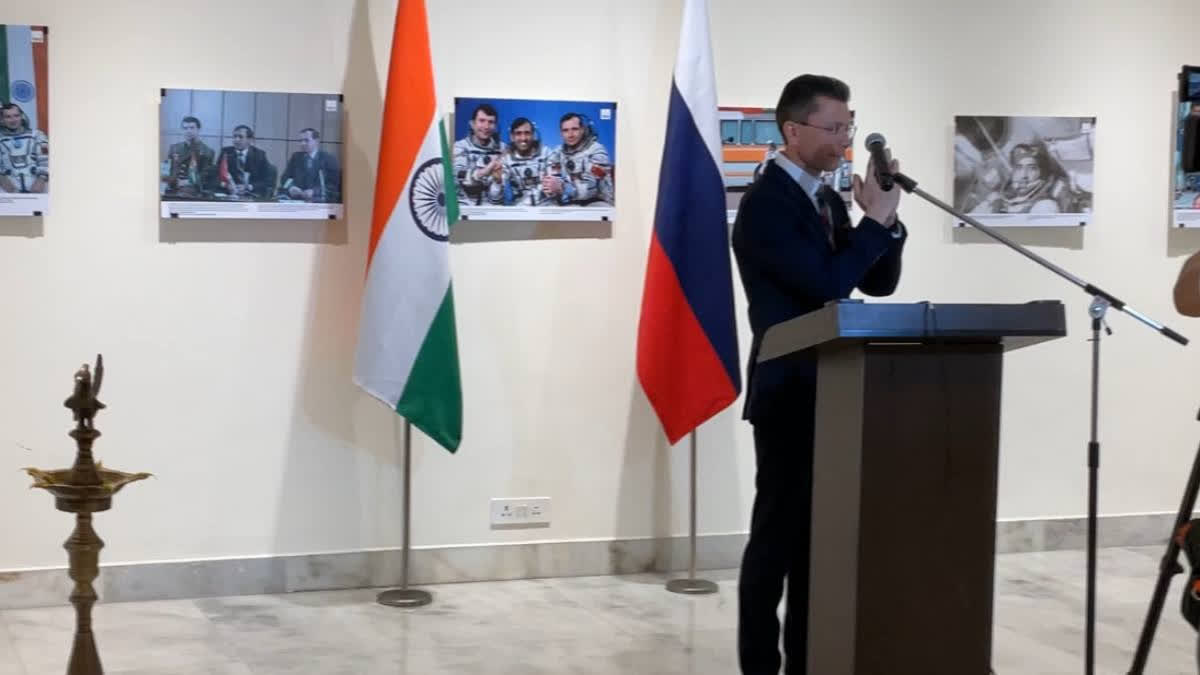New Delhi: Hailing India's success in the space program, the Deputy Head of Mission of the Russian Embassy in New Delhi, Roman Babushkin said India has developed its robust national space program and enjoys the status of a space superpower, well-reputed, reliable, and preferred global partner for space science and satellite launching.
This comes as the Russian embassy in Delhi commemorates the 40th anniversary of the spaceflight of the first Indian cosmonaut, Rakesh Sharma, aboard the Soviet spacecraft Soyuz T-11 in 1984.
Babushkin said that Russia as a pioneer in space exploration, has always been favouring the Indian success, adding, 'Our engagements go back to 1975, when the Soviet Union assisted to launch Aryabhata- India's first satellite. The second satellite Bhaskara was launched by the Soviet Union in 1979'.
Highlighting the India-Russia space collaboration, the Russian Deputy Head of Mission said, "Russia remains one of India's leading partners. The Russian State Corporation 'Roscosmos' and ISRO are deeply involved in the implementation of the Indian Gaganyan mission by training astronauts, providing assistance in the development of manned spacecraft, supplying life-support and crew-escape systems, flight suits, couches, rate sensors, cooperating on thermal protection coatings, applied materials, and space medicine capacity building".
He further noted that now India, having developed its robust national space program, by right enjoys the status of a space super-power, well-reputed, reliable, and preferred global partner for space science and satellite launching. The successful Chandrayaan-3 project is a huge landmark."
Ahead of the 77th anniversary of the establishment of Russia-India diplomatic relations, the diplomat said that the vibrant partnership between the two countries, includes space propulsion engineering, cryogen engine construction, satellite navigation, and establishing ground stations for receiving communication signals.
“We are exploring new tracks emanating from the prospects of a wider involvement of the private sector and start-ups," he further added. The Russian diplomat further pointed out how India and Russia 'closely coordinate' at the dedicated multilateral platforms, first of all, the UN and its Outer Space Committee. He also went on to underline how the month of April holds a reason to celebrate.
"We maintain in-depth dialogue to prevent arms races in outer space and promote the Russian initiative of non-placement of weapons in outer space. This is also part of our agenda in BRICS, including the agreement on the remote satellite constellation', he said.
"We have many reasons to celebrate this month, including the 63rd anniversary of the first human space journey by the legend Yury Gagarin on April 12 as well as the 77th anniversary of the establishment of Russia-India diplomatic relations on April 13.
More and the Russian presidency in the expanded BRICS. However, the theme of space and the historic importance of the great deed by Rakesh Sharma epitomizing the spirit of our friendship deserves to be an undoubted background for our overall cooperation in 2024," he added.
On Wednesday, Russian news agency TASS in collaboration with the Russian House in New Delhi and the embassy of the Russian Federation in India organized a unique photographic exhibition about Rakesh Sharma's historic space flight.
Squadron Leader Rakesh Sharma became the first Indian to go into space as he launched aboard the Soyuz T-11 on April 3, 1984. The Indian Air Force pilot was part of a three-member crew that rode to the soviet Salyut-7 space station.
Read More



